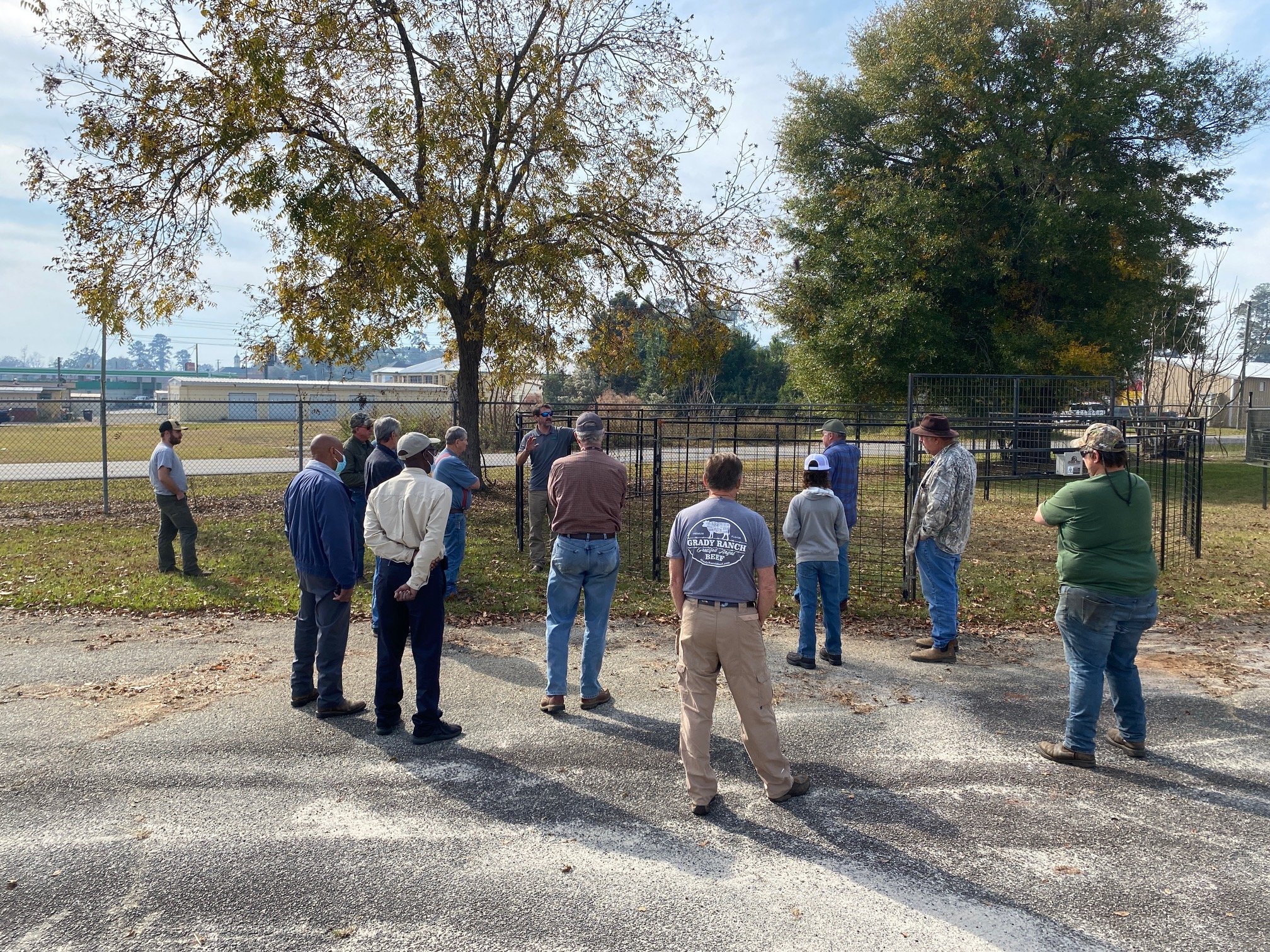Feral Swine Workshop Highlights Effective Control Techniques
On December 3, the Flint River Soil and Water Conservation District hosted a Feral Swine Control Workshop in partnership with USDA Animal and Plant Health Inspection Service (APHIS), the Jones Center at Ichauway, UGA Warnell College of Forestry and Natural Resources, and University of Georgia Cooperative Extension Service at the Grady County Agric-Center in Cairo, Georgia.
Workshop attendees observe a large corral style trap demonstration (photo credit: Cale Cloud)
Dr. Mike Conner, Wildlife Ecologist at the Jones Center at Ichauway, began the workshop with an overview of feral swine biology and behavior—providing important context around the issue of feral swine, their destruction, spread, and the economic and human impact.
“Feral swine have existed in North America for almost 500 years, and their damage to natural resources likely began the day they set foot on the continent,” says Dr. Conner. “ Feral swine have the greatest reproductive capacity of any mammal their size, but 500 years of reproducing in the wild does not explain the rapid range expansion that has occurred during the past 100 years. The near quadrupling of the number of states with feral swine during the past century seems to be partially the result of both accidental and purposeful release of pigs. Managing feral swine populations and their damage is not as dependent on the number of pigs removed as much as it depends on the number of pigs left behind. Sustained trapping efforts with the goal of whole-sounder removal offer the best solution to managing feral swine damage.”
Matt Ondovchick, Wildlife Services specialist at USDA-APHIS, followed with a presentation on effective control methods and best practices, as well as a demonstration of large corral style traps. Corral style traps are used to in whole sounder removal, which is widely recognized by experts as the most effective method of feral swine control.
Attendees of the workshop were local landowners who have faced feral swine issues on their own properties. It’s estimated in Georgia alone feral swine cause over 150 million dollars in economic damage, and according to a 2015 survey, 79 percent of survey respondents do not want feral swine on their property.
“For the people of Grady County, the issues with feral swine seems to continually get worse. This worrisome pest and the numerous issues it brings does not seem to be getting any better,” says Cale Cloud, Grady County UGA ANR Extension Agent. “Farmers face numerous challenges when trying to grow a crop from rising input prices to being at the mercy of Mother Nature. Feral swine adds a whole new challenge that our growers have to deal with. The damage that these animals can cause to a crop after a grower has put all of their hard work into can be devastating. Because of these issues that we have faced in our county, the Flint River Soil and Water Conservation District decided to team up with UGA Extension to hold a feral swine workshop here in Cairo. This successful event brought in farmers, homeowners, and land owners from Grady County and the surrounding areas and taught them the basic biology of feral swine and effective control methods. I am thankful for the partnership that UGA Extension has with the Flint River District and I am confident that the education and outreach on the topic of feral swine will be beneficial to the people of Grady County.”
The Flint River Soil and Water Conservation District is comprised of farmers, landowners, and community leaders that are dedicated to the conservation, wise use, and protection of natural resources in the Flint River Basin. Learn more about the District at flintriverswcd.org.
For more information on feral swine control efforts across the state, visit georgiaferalswine.com.
